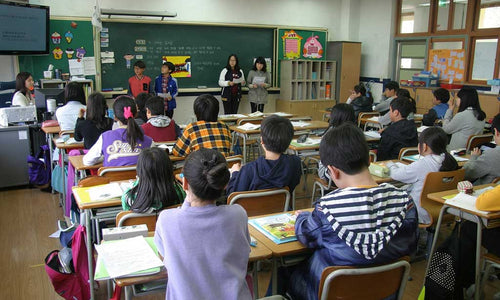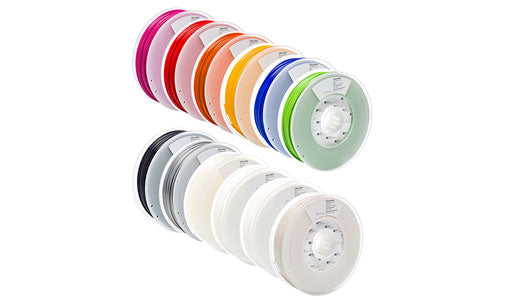Bambu PET-CF
Bambu PET-CF is a blend of tough PET and carbon fiber. Carbon fiber improves hardness and mechanical strength, while still help maintain the low warping and shrinkage of ordinary PET. Bambu PET-CF has excellent high temperature resistance and a soft glow appearance. Its excellent strength, heat resistance, dimensional stability and low moisture absorption make Bambu PET-CF an ideal choice for load-bearing structures or prints used in high temperature and humid environments.
Low moisture absorption
In saturated water absorption conditions, the strength and stiffness of PET-CF have small losses, making it suitable for prints used in high humidity environments.
Normal PA-CF:
Loading Weight: 1 kg
Bambu PET-CF
Loading Weight: 1 kg
The test models have a span of 220 mm and a thickness of 3 mm in unloaded state.
High dimensional stability
Due to the creep and warping resistance of PET-CF, prints can achieve excellent matching accuracy.
Specimens size (L*W*H): 240*8*15 mm³
Infill density: 60%
Exceptional Thermal Resistance
• Specimen size (L*W*H): 95*10*4 mm³
• Test conditions: Specimens were put in an oven at 70 °C and 150 °C respectively for 0.5 hour.
* As a crystalline material, PLA will significantly deform only after the temperature exceeds its melting point (around 155°C).
Printing Setup
- 0.6 mm Hardened Steel Nozzle (Recommended)
0.4 mm / 0.8 mm Hardened Steel Nozzle (Capable) - Enclosed printer (Recommended)
Open frame printer (Capable)* - AMS NOT compatible
*Layer bonding of some prints may become low due to overcooling.
Parameters Comparison
| PET-CF | PAHT-CF | |||
| Composition | PET, carbon fiber | PA 12 and other long-chain PA, carbon fiber | ||
| Hotend Compatibility | Hardened Steel 0.6 (recommended), 0.4, 0.8 mm | Hardened Steel 0.6 (recommended), 0.4, 0.8 mm | ||
| Build Plate Compatibility | Engineering Plate, High Temperature Plate, Textured PEI Plate | Engineering Plate, High Temperature Plate, Textured PEI Plate | ||
| Glue |
|
| ||
| AMS Compatibility | NO |
| ||
|
| < 100 mm/s | ||
| Toughness (Impact Strength - XY) | 36.0 kJ/m² | 57.5 kJ/m² | ||
| Strength (Bending Strength - XY) | 131 MPa | 125 MPa | ||
| Stiffness (Bending Modulus - XY) | 5320 MPa | 4230 MPa | ||
| Layer Adhesion (Impact Strength - Z) | 4.5 kJ/m² | 80 MPa13.3 kJ/m² | ||
| Heat Resistant(HDT, 0.45 MPa) | 205 °C | 194 °C | ||
| Saturated Water Absorption Rate / % (25 °C,55% RH) | 0.37 | 0.88 | ||
| Price/1kg | $84.99 | $94.99 |
Accessory Compatibility
| Recommended | Not Recommended | ||
| Build Plate | Engineering Plate, High Temperature Plate or Textured PEI Plate | Cool Plate | |
| Hotend |
| Stainless Steel Nozzle (0.2 / 0.4 mm) | |
| Glue | Bambu Glue Stick | Bambu Liquid Glue |
Recommended Printing Settings
Drying Settings (Blast Drying Oven):
80 °C,8 - 12 h
Printing and Keeping Container's Humidity:
< 20% RH (Sealed,with Desiccant)
Nozzle Temperature:
260 - 290 °C
Bed Temperature (with Glue):
80 - 100 °C
Printing Speed:
< 100 mm/s
Physical Properties
Density:
1.29 g/cm³
Vicat Softening Temperature:
226 °C
Heat Deflection Temperature:
205 °C
Melting Temperature:
250 °C
Melt Index:
25.3 ± 2.5 g/10 min
Mechanical Properties
Tensile Strength:
74 ± 6 MPa
Breaking Elongation Rate:
54.5 ± 1.2 %
Bending Modulus:
5320 ± 270 MPa
Bending Strength:
131 ± 6 MPa
Impact Strength:
36.0 ± 2.7 kJ/m²
Frequently Asked Questions
What is the difference between PET-CF and PETG-CF?
The primary difference between PET-CF and PETG-CF lies in their base material. PETG-CF is a reinforced material made by adding carbon fiber to glycol-modified polyethylene terephthalate (PETG), while PET-CF is to polyethylene terephthalate (PET). The key difference 'G' in PETG stands for glycol. PETG is a glycol-modified version of PET that contains small amounts of glycol as a co-monomer. The addition of glycol to PETG reduces its crystallinity and makes it more transparent. However, it also reduces its strength and stiffness.
The difference in application between PETG-CF and PET-CF?
PETG-CF is a versatile basic material that is suitable for printing everyday items, such as bent, folded, and movable parts, due to its excellent toughness and ease of printing. PET-CF, in contrast, contains a greater amount of carbon fiber and is significantly stronger and more temperature resistant compared to PETG-CF. PET-CF is a professional-grade engineering material that is suitable for use in more complex and demanding environments.
What is PET-CF used for?
Due to its dimensional stability and lower water absorption rate, PET-CF is a better choice than nylon for printing functional parts used in high humidity environments. Also, its high-temperature resistance and low warping make it suitable for printing mechanical assembly parts, such as automotive accessories and fixtures.
Downloads
Printing Tips
• Drying conditions: 80℃ for 8 hrs. PET-CF is highly sensitive to humidity. To achieve optimal printing performance, it is recommended further drying before use and after storage. For more details, please refer to:Filament drying instructions on WIKI.
• To prevent the material from absorbing moisture, it is recommended to use an airtight storage container with desiccant during printing. For more details, please refer to:Printing tips for Engineering materials on WIKI.
What's in the Box?
Filament with Spool*1 & Desiccant*1
Filament Label*1
Package*1









